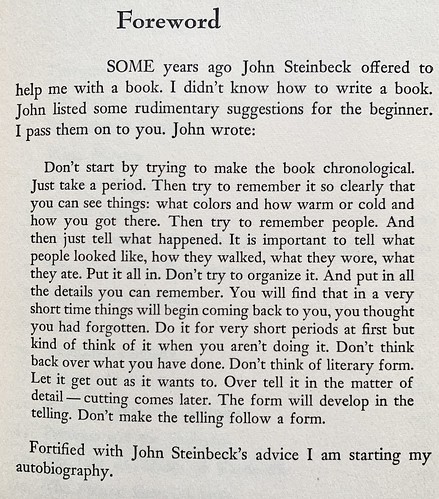I remember it began: "I remember something made me read this old blog post of mine, from 2013, when I had a little project going where I'd take one sentence from 'The Great Gatsby' and present it for discussion.... The sentence of the day was 'I remember the fur coats of the girls returning from Miss This-or-That’s and the chatter of frozen breath and the hands waving overhead as we caught sight of old acquaintances, and the matchings of invitations: 'Are you going to the Ordways'? the Herseys'? the Schultzes'?' and the long green tickets clasped tight in our gloved hands.'"
I'm looking back at that post because I just did a search of my archive for "Brainard," because I'm reading a new article in The New Yorker, by Joshua Rothman, "What Do You Remember? The more you explore your own past, the more you find there" and it begins: "Last year, for my birthday, my wife gave me a copy of 'I Remember,' an unusual memoir by the artist Joe Brainard. It’s a tidy little book, less than two hundred pages long, made entirely from short, often single-sentence paragraphs beginning with the words 'I remember.'"
Showing posts with label Fred Allen. Show all posts
Showing posts with label Fred Allen. Show all posts
April 16, 2025
I remember a blog post from December 6, 2021 titled "I remember...."
But what is Joshua Rothman saying about it?
January 26, 2021
How to write a book.

Photographed by me, just now, from a book that appears in my earliest childhood memories. I've never read the book, but I saw it and played with it before I could read, and when I could read, I read and puzzled over the title. I knew my parents loved the author, a radio comedian who died, too young, in 1956. The book is ©1956.
I kept the book for my own library after my parents were gone, and I knew exactly where to find it in my disorganized shelves when the author's name came up in conversation here at Meadhouse. The conversation began with a report of something funny that had happened outside in the snow, and a confession of mine about being too concerned about embarrassment when I was a child, which led Meade to engage in a type of transgressive humor that I associated with Louis CK, whom Meade contrasted to Red Skelton, a sweet, gentle comedian we both remember loving back in 1950s TV.
I guessed — for no reason other than his on-screen niceness — that Red Skelton might have been a terrible person in real life. I went looking for dirt on his Wikipedia page. I didn't read every word, and I didn't find any dirt, but I got interested in the subject, so timely today, of censorship:
On April 22, 1947, Skelton was censored by NBC two minutes into his radio show. When he and his announcer Rod O'Connor began talking about Fred Allen being censored the previous week, they were silenced for 15 seconds; comedian Bob Hope was given the same treatment once he began referring to the censoring of Allen.
[FOOTNOTE] Fred Allen was censored when he referred to an imaginary NBC vice-president who was "in charge of program ends". He went on to explain to his audience that this vice-president saved these hours, minutes and seconds that radio programs ran over their allotted time until he had two weeks' worth of them and then used the time for a two-week vacation.
And then I was reading the Wikipedia article on Fred Allen, whose book I played with when I was a child and have kept all these years but never read:
Tags:
1950s,
books,
censorship,
comedy,
Fred Allen,
John Steinbeck,
Louis C.K.,
nice,
nothing,
radio,
Red Skelton,
TV,
writing,
Young Althouse
Subscribe to:
Posts (Atom)



